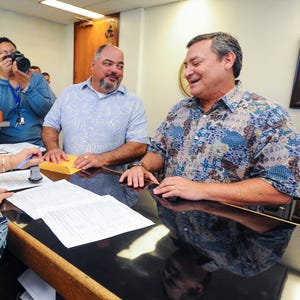A Decolonization Commission task force has started monthly meetings, or general assemblies, to educate and engage the island community regarding the political status option of independence.
The Independence for Guahan Task Force is one of three commission task forces charged with spearheading efforts to educate and inform Guam about the three political status options available to the island’s residents, should a plebiscite be held.
The plebiscite is a nonbinding voter referendum to measure the preferred political status of the island’s native inhabitants in regards to Guam’s future relationship with the U.S. The three self-determination options for Guam are independence, statehood and free association.
The University of Guam’s Social Work and Chamorro Studies Program similarly will host a two-hour forum Thursday evening to discuss efforts to decolonize Guam and New Caledonia.
Also Thursday, the federal court is scheduled to hear arguments by Arnold Davis, who has challenged the political status plebiscite, arguing it is discriminatory on racial grounds. Davis, who is neither legally nor ethnically Chamorro, has not been allowed to register for the plebiscite.
According to Independence Guahan Chairman Michael Lujan Bevacqua, the individual groups are connected to the commission, but each task force has its own autonomy and budget to carry out its mandates.
“So the chair for each task force gets to serve on the commission,” Bevacqua said. “We get to vote on the commission, and the commission gives us funding to undertake our education campaign.
Each task force currently has a budget of about $80,000, Bevacqua said.
The independence group held its inaugural general assembly last Thursdayat the main pavilion of the Chamorro Village in Hagåtña and will continue to meet there once a month to provide informational presentations and answer questions related to a decolonized island.
The monthly general assembly will provide a regular forum for Guamanians who have questions about ending Guam's status as a U.S. colony. Each meeting will also address different aspects of Guam as an independent island.
Last Thursday, the task force focused on the question of “status quo” — that is, if Guam were to remain an unincorporated territory.
“Members of our community regularly ask why ‘status quo’ is not an option in Guam’s political status plebiscite,” Independence co-chair Victoria-Lola Leon Guerrero said in the group’s press release. “We felt it was important to illustrate the many ways in which being an unincorporated territory has hindered our political and economic development and has impacted the social and cultural welfare of our community.”
The task forces’ current mission of educating and leading other outreach activities is separate from the public education campaign Gov. Eddie Calvo talked about in his State of the Island Address in March.
Calvo had announced plans to lead an education campaign regarding the three political status options before holding a plebiscite as part of the General Election this November. Depending on how well the campaign went, the governor was to make his final decision about the plebiscite in July. It has again been postponed.
Bevacqua said the governor's education campaign never really got off the ground. The Calvo administration made some efforts toward the initiative, such as declaring May Decolonization Registry Month, which increased the island’s Native Inhabitants registry by more than a 1,000 people.
The registry is the Guam Election Commission's running list of registered native inhabitants, who by law are the only residents who can participate in the plebiscite.
“So they did that, but they didn’t carry out the aggressive education campaign,” Bevacqua said, adding: “The governor had a bold aggressive plan, but he didn’t sort of complete what was intended.”
Troy Torres, Adelup's policy adviser,acknowledged the summer education campaign didn't go as planned, but said the administration plans to start disseminating educational literature to the public, beginning this month, as it kicks off the education campaign with a community meeting in Hagåtña.
The educational campaign and overall plebiscite were delayed, Torres said, because the commission first wanted to address the requirement in Guam law that a plebiscite can be held only after 70 percent of eligible voters have registered.
A letter was sent to the attorney general's office months ago, seeking clarification on the issue, but the commission never heard back, Torres said. He said it's apparent the attorney general does not plan to respond because of the ongoing court challenge to the plebiscite, by Davis.
The commission is also working on contracting an expert on self-governance to lead a program or institute, Bevacqua said. The expert would collect data from government agencies and conduct studies on the social and economic impact each political status would have on Guam.
“That’s the stuff we really need,” Bevacqua said. “We want experts to give us those types of perspectives.”
The UOG forum will be at the Lecture Hall, from 6:30 to 8:30 p.m. Thursday.
The Independence Task Force will hold its next general assembly at Chamorro Village on Sept. 22 at 6 p.m.
The motion hearing for Davis' request for summary judgment is scheduled for 9 a.m. Thursday in the U.S. District Court of Guam. The court in February 2014 had dismissed Davis' case, ruling that he has not been harmed because there has not been a plebiscite and a plebiscite has not been scheduled.
But the U.S. 9th Circuit Court of Appeals disagreed, and in May 2015 sent the case back to the Guam federal court.




No comments:
Post a Comment